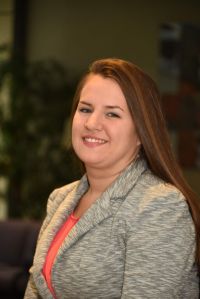When a large company contracts out jobs to smaller ones, who then hire workers as “independent contractors,” is the large company liable when the workers aren’t paid what they’re owed? It’s a tricky question that depends partly on how much control the large company exerts over what the workers do. It’s also an issue that’s leading to major litigation, including a recent lawsuit by New York State against Domino’s Pizza (which allegedly encouraged its franchisees to use payroll software that undercounted workers’ hours), and a $240 million settlement by Fed Ex in a nationwide class action on behalf of 12,000 underpaid drivers.
This spring, three Sheller Center students – Crystal Felix, Paige Joki and Daniella Lees — confronted a local version of the problem. Working with attorney Marielle Macher of the Community Justice Project, the students filed suit in federal court against a company that initially argued that it had no responsibility for wage theft by its subcontractors.
Ms. Felix notes that “seeing how prevalent wage theft is in Philadelphia is just mind-blowing.” And so, besides handling the case, she worked with Community Legal Services on the implementation of Philly’s recently-enacted wage theft ordinance. More on that soon!

 Newly graduated and on her way to a judicial clerkship, Emily Bock was
Newly graduated and on her way to a judicial clerkship, Emily Bock was  Master Sante Reaves, Ms. M, Ms. M’s son, Malcolm Ingram 3L and Prof. Sarah Katz.
Master Sante Reaves, Ms. M, Ms. M’s son, Malcolm Ingram 3L and Prof. Sarah Katz.